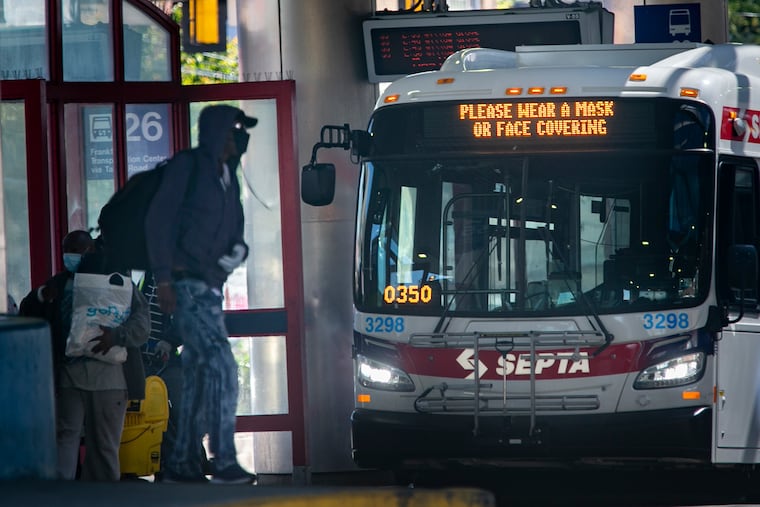Most SEPTA transit service returning; fare collection to resume on buses and trolleys
“Just want everyone to know that this service is not going to be perfect," SEPTA General Manager Leslie Richards said.

SEPTA is preparing for the Philadelphia region’s eventual reopening, with plans to restore much of its transit service later this month.
Regular weekday and weekend service levels on most bus and trolley routes, as well as the Market-Frankford, Broad Street, and Norristown High Speed Lines will return the week of May 17, SEPTA announced Friday. The transportation authority also will bring back front-door boarding and fare collection on buses and trolleys.
“Just want everyone to know that this service is not going to be perfect," SEPTA general manager Leslie S. Richards said, "but it is what we can do right now to serve essential workers and obviously prepare for the expected increase of service needs in the coming weeks.”
Although the Market-Frankford and Broad Street Lines will run more frequently, SEPTA will keep some stations closed until further notice. The authority will resume Night Owl bus service for both lines on weekdays as well as overnight and service on the El and subway on weekends. Current operations suspend service from 1 until 4:30 a.m. for cleaning.
Regional Rail will still run on a reduced schedule.
The Route 101 trolley will run as a bus, while the Route 102 trolley will remain suspended. The Route 91, serving SCI Phoenix, will also remain suspended. Routes 204, 310, and 311, and LUCY Gold and Green Routes will continue on a reduced schedule.
SEPTA slashed operations last month with a “lifeline” schedule that closed subway stations, limited bus and trolley service, and suspended some Regional Rail lines. The transportation authority provides a means of travel for many of the region’s essential workers amid the coronavirus pandemic, but those changes have meant grueling commutes with long waits and overcrowding for some.
SEPTA hopes added service, with return to a timetable-based schedule, will help address some of the problems. Though the Philadelphia region remains under a stay-at-home order through June 4, Scott Sauer, SEPTA assistant general manager of operations, said the authority wants to get in front of an official return.
“This will give us the opportunity to do that,” Sauer said. “Work out some of the kinks of returning to a full-service schedule.”
SEPTA will keep up social distancing measures, including rider limits: no more than 20 on buses, 25 on trolleys, and 30 on the Norristown line. Last month, SEPTA said it would reintroduce articulated buses, which are about a third longer than the buses it is using, after finding an effective way to clean cloth seats and install protective shields.
Bus and trolley riders can expect seats to be marked off to promote social distancing, and a yellow line will encourage riders to stay six feet away from operators.
SEPTA previously suspended onboard fare collection and implemented rear-door boarding to distance riders from drivers, who sit next to fare boxes and card readers. The reversal will “give our operators a better way of metering how many people they board" and "helps limit those nonessential trips,” Sauer said. Riders are to exit buses and trolleys using rear doors.
On the El, the Frankford Transportation Center, Arrott Transportation Center, Erie-Torresdale, Allegheny, Huntingdon, Berks, Girard, Spring Garden, Eighth Street, 11th Street, 15th Street, 30th Street, 34th Street, 40th Street, 46th Street, 56th Street, and 60th Street stations as well as the 69th Street Transportation Center will be open.
On the Broad Street Line, riders can access the Fern Rock Transportation Center, Olney Transportation Center, Hunting Park, Erie, Allegheny, North Philadelphia, Cecil B. Moore, Girard, Race-Vine, City Hall, Walnut-Locust, Ellsworth-Federal, Snyder, and Oregon stations as well as NRG Station. Staffing shortages related to the coronavirus forced SEPTA’s limited schedule.
SEPTA has seen more than 250 confirmed employee coronavirus cases, and seven of its employees have died of COVID-19 complications. Workforce absenteeism related to the coronavirus continues to be a challenge, Sauer said.
“This should not be interpreted as SEPTA’s ready to run full speed ahead,” he said. "We’re certainly not at that point yet. Although we are certainly better off today than we were a month or so ago.”
Transport Workers Union Local 234 president Willie Brown said he anticipates problems could arise once stay-at-home orders are lifted across the region.
“We got a lot of figuring out to do on things in the future, I think," he said. "But right now, we’re operating in the dark and trying to make our way, because it’s new for everybody. Us as well as SEPTA.”